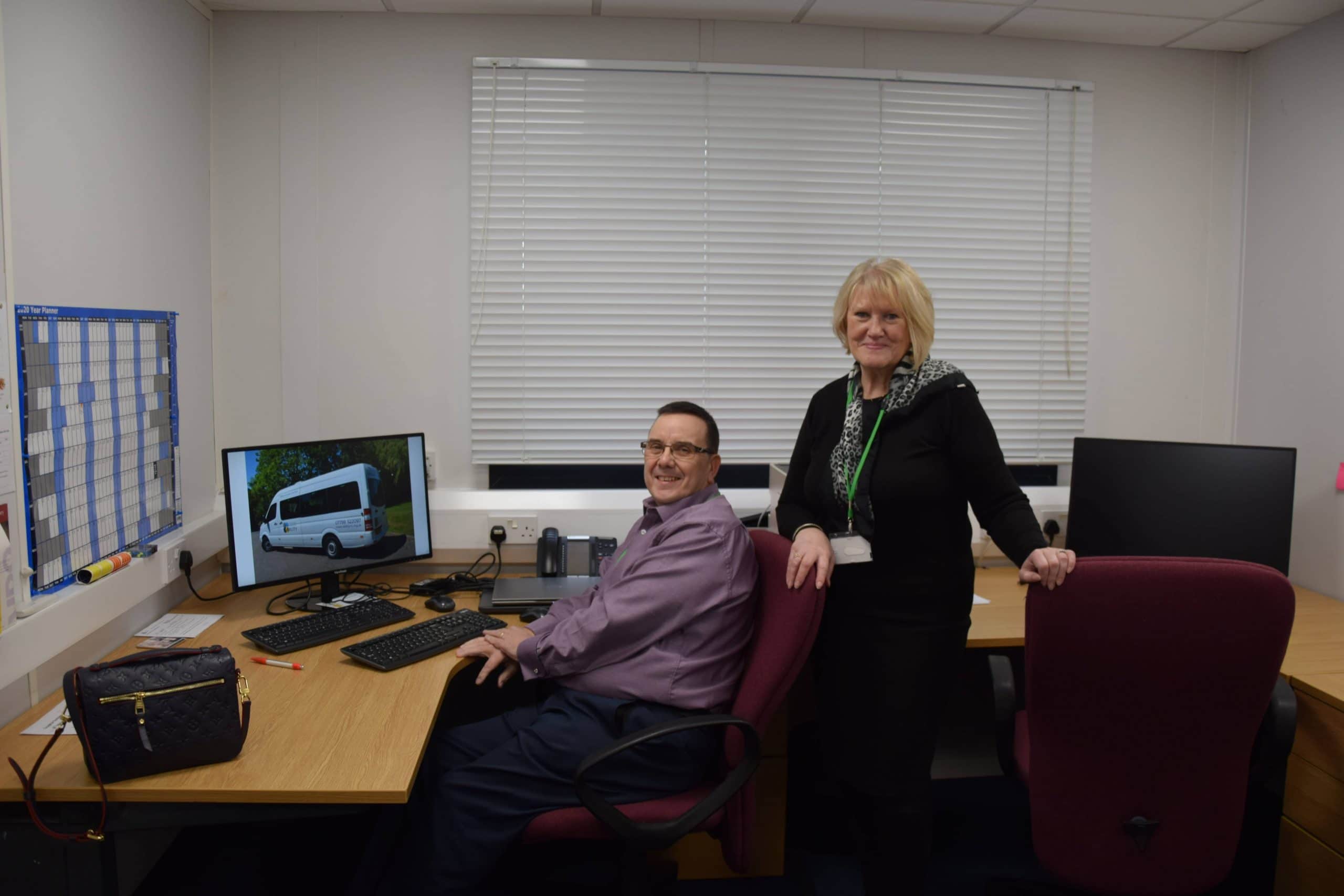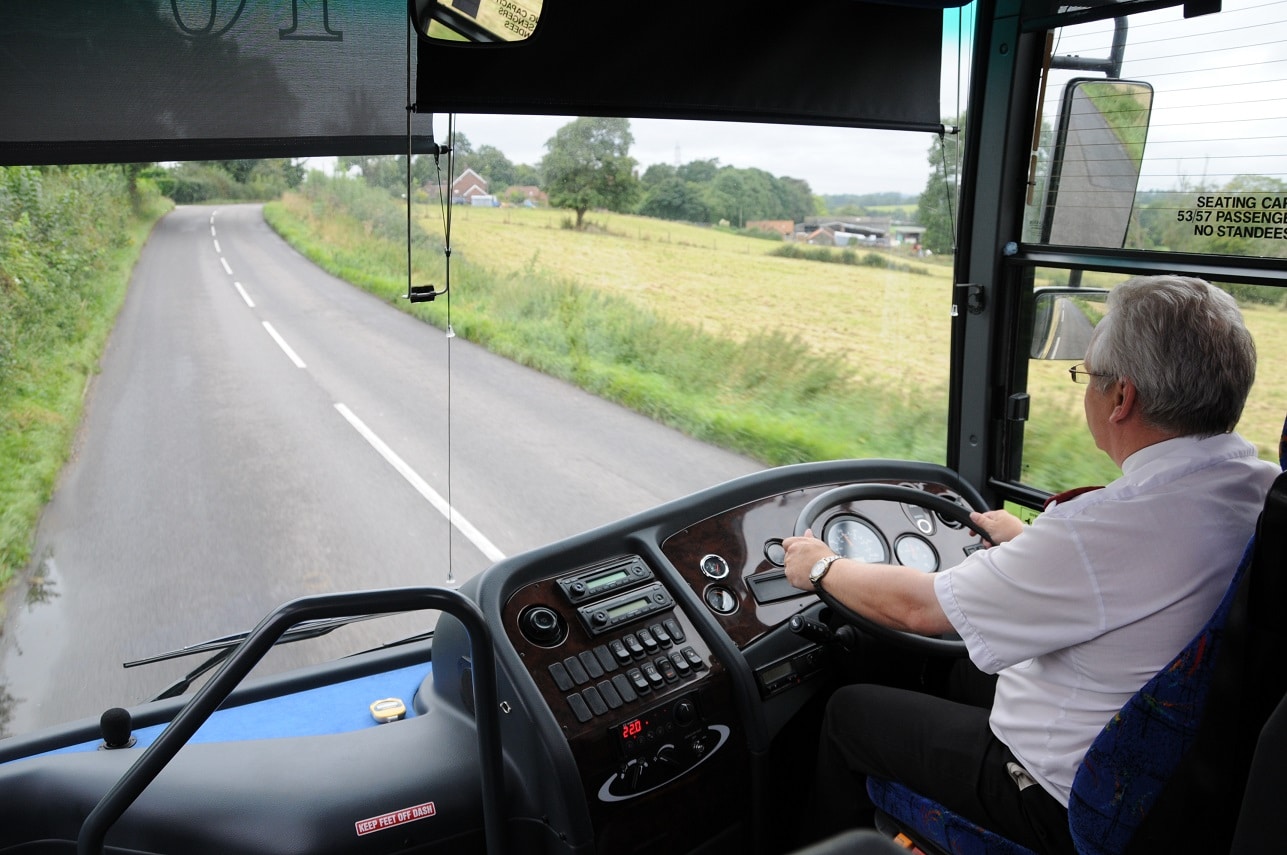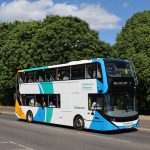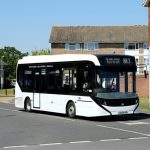In just over a year Ability Community Transport has doubled in size. And smart management has brought in extra funding and some clever ideas for diversifying
ABILITY Community Transport was set up 18 months ago, originally to reduce social isolation and loneliness.
Husband and wife team Lynn and Nigel Hinch who had both had corporate jobs, decided to “leave the rat race and do something a little different for the community.”
Nigel had been a Transport Manager in the road transport industry for nearly 40 years.
It took six months to set up the project, which is based at the Caswell Science and Technology Park in Towcester. It went live on 1 January 2019, with just one minibus – a Volkswagen Crafter with a Stanford conversion described as “quite old”.
The original Volkswagen Crafter was partly funded by South Northamptonshire District Council (SNDC) and the balance by the Hinches to get the business up and running.
Within days of going live, the parish council of Hackleton called Ability to say that the local bus service had been cut and it had parishioners needing transport.
Lynn says: “There had a been a daily bus and it suddenly went to nothing, leaving a lot of people isolated. We had spent six months in planning and knew where we were going and what needed to be done, so were able to start the service for Hackleton the very next day.”
The passengers, mostly concessionary bus pass holders, needed to be dropped off in Northampton town centre so they could go shopping or go to the bank or the hairdressers.
Nigel adds: “We understand what the issues are, bus cuts are inevitable, but it becomes a bit of a joke that we’ve got more passengers on our bus than on a double-decker that is driving past. It’s unbelievable, but it’s the middle of the day.”
Meeting residents’ needs
Demand grew very quickly and three months later the company bought another two minibuses, one of them to replace the first. With two minibuses now on the go the operator was busy going out to the local villages collecting people and dropping them off all around the county.
Although 98% of its passengers are elderly there are a few younger people. Some have disabilities, some are accompanying an older person, some may have lost their licence, and some are young parents with children who are unable to get out and about.
The minibuses service towns and villages in the South Northamptonshire and North Oxfordshire areas. Ability currently operates a flexible registration under a Section 22 permit but is considering moving to an O-Licence as it meets all the requirements.
Lynn explains that parish councils contact them when the local area has no bus service. Ability also contacts councils to ask if it has a transport facility or if it needs its residents supporting.
“More often than not they want us to go and talk to them and then it’s a case of exploring what works for them,” says Lynn.
“Often we will go and speak with residents at their coffee mornings and find out what they want and where they want to go.
“Once we know that, we get people signed up for the service. They have to register with us so we can take a note of their concessionary pass and then reclaim the fare back.”
Residents are picked up from home or a local pick-up point. Some villages still retain and upkeep the original bus stop.
Applying for funding
In September 2019, Ability bid for some European funding – luckily before Brexit.
Lynn says: “You can no longer apply for European funding, but we managed to win a Leader grant by the skin of our teeth.”
The grant went through and was approved just in time for the December Brexit deadline, and a brand-new Mercedes-Benz Sprinter is now on order from EVM.
Once again it was part-funded by SNDC and Ability’s reserves.
“We’ve got two vehicles ordered for April,” says Lynn. “One is a used one from a local dealer and the other is the new one. They are both a bit more on the luxury side with 13 seats for passengers, one for the driver, one for passenger assistant, privacy glass, USB ports, heaters in the rear and air conditioning.”
The original 17-seater was adapted by having two seats taken out to leave space for shopping trolleys, walking frames and pushchairs.
There is a restriction on where the Leader funded bus can travel. The money is given for rural communities and is often granted to farmers. The grant is for minibuses that pick up from the Clay Vales area of rural Northamptonshire.
Doubling in size
In just over a year ABILITY is now transporting over 500 people. It uses Flexiroute software to schedule the buses and protect people’s personal data. Drivers have all of the information on their phones.
Lynn says: “It’s a fantastic system which really manages the whole operation, so we know what’s happening on a minute by minute basis.”
Operational five days a week, Ability has one regular driver and two other volunteers. The current buses are parked at the Towcester site and a site in Courteenhall.
Now looking out for more drivers, Lynn explains that they don’t usually advertise. “People find us and apply for the role of driver,” she says. “People are keen to work with us as we offer flexibility from a couple of hours a week to suit them.”
The next village to join the scheme is King’s Sutton, with Aynho, Charlton, Croughton, Middleton Cheney and Brackley, all waiting in line.
Broadening the horizons
“The future is looking really busy,” says Lynn. “We have been identified as one of SNDC’s strategic partners.
“We are supporting the main buses in the area – not taking over – but looking at filling in the gaps where they don’t go, reaching the people they cannot reach and providing a very personal service, meeting passengers’ individual needs; being customer centric.
“For us it’s working alongside those operators – complementing them.
“For example, we don’t go to Milton Keynes but we can take people to a bus stop where they can pick up a Stagecoach bus to go there.”
Age UK in Northamptonshire has approached Ability to see if it can support its operation in transporting people to local day care centres.
“Nigel is already the MiDAS trainer for Age UK,” says Lynn. “So he trains all of its drivers on the scheme in accordance with CTA guidelines and is also able to deliver Driver CPC training in mobility and wheelchair usage and safety.”
Railway plans
Ability’s next venture is working with West Midlands Trains (WMT) to try and bring an all-travel solution to residents.
Nigel says: “We are talking with WMT with an aim to co-ordinating travel for people so that they can use our community transport to the get to the railway station, and then use the train to get to a destination.
“There are people travelling half an hour to get to a station and then finding the area gridlocked and parking difficult.
“They could have been sitting on the bus on their phone or laptop like they do on the train. The idea is that we will add ‘home to station’ as one of our services.”
He adds: “WMT has committed to spending at least £1m as part of its rail franchise, supporting local businesses and organisations which don’t have to be a direct benefit back to them.
“Our unique point is that we will be a direct benefit back to them. Part of the scheme is that Lynn and I have got a business coach funded by WMT as part of that investment.”
Ability is also available for rail replacement and can pick up small groups from the station and take them directly back to the smaller towns and villages quicker than traditional means.
Pilot scheme
Nigel and Lynn are looking at several ways to diversify.
Nigel says: “Next month we’ve got a pilot where we are taking a group of 12 people to Northampton railway station where they will catch a train to the National Exhibition Centre (NEC) to visit Crufts. The groups will be guided and helped by WMT station staff onto the train and off, to make sure they get to Crufts safely.
“The traditional community transport model is becoming flawed because there’s no grant funding available.
“While they provide an essential service to the ageing population, the ongoing legislative and commercial demands are making it difficult for some of them to continue once their reserves have gone”
“It doesn’t get recognised as much as Boris Johnson’s promise to raise billions of pounds for the coach and bus industry.
“That money will not get to community transport, so when we set this up we identified that we had got to be different, we’ve got to have a different approach, although we’ve got some initial ‘seed corn’ funding we needed it to get established to get a name for ourselves.
“Now we’ve got to look at getting best use out of the vehicles that we have.”





























